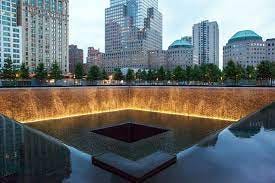We Never Reckoned With 9/11
It’s been twenty-two years now since September 11, 2001. Enough has happened since then for America, including two wars, Hurricane Katrina, the worst economic downturn since the Great Depression, the Trump years, police murders, mass school shootings, and an attempted coup. An event that once seemed so raw feels like something that took place in a long-ago time.
While much of this has to do with the passage of time and the other intervening tragedies, it’s also rooted in the evasive ways our society has treated its memory. We never actually reckoned with that day.
This might be hard to believe for people who lived through the event’s aftermath, when it dominated the national consciousness. However, that engagement with the event was shallow. Very quickly, a moment of horrific tragedy got turned into a symbol by various groups of people. The nationalistic narrative preferred by the Bush administration (and most Americans at the time) turned it into a modern Pearl Harbor, a crime to be avenged. This interpretation powered public support for disastrous wars in Iraq and Afghanistan, as well the fearsome growth of the national security state.
Simultaneousy, some on the margins used questioning this narrative to bolster their rebellious bona fides. For some it meant engaging in ridiculous conspiracy theories. For others (located more firmly on the left) it meant treating the dead as imperialist lackeys.
None of these ways of understanding 9/11 have done anything to reckon with the event’s visceral horror. Thousands of people just going about their daily lives were murdered that day in shocking fashion. People tend to want to turn their heads from that basic fact, and it’s understandable. Every year since I have tried to put myself back in my head in that moment, before the dominant narratives took over. It was a moment of shock and confusion like any other I have experienced. The future seemed both dark and completely uncertain. I had the sinking feeling, which sadly turned out to be true, that the coming years were going to bring even more suffering.
Much of the lack of reckoning has to do with the intensity of the official response. Those who embraced it went whole hog for Bush’s wars, then quietly forgot about all that once those wars turned to shit. These same people did not want to see what the attack showed the world: the United States was no longer an inviolable superpower. All the flag waving was a desperate attempt to paper over this nation’s fragility.
By refusing to talk about 9/11 in terms of tragedy (as opposed to “chickens coming home to roost”) a lot of radicals got to avoid the human element completely. Unlike the flag-wavers, they were able to see what this attack meant for America’s self-conception. At the same time, they were too busy using it to affirm their worldview to contemplate the genuine horror of the attack. In this respect they were very similar to their opposites, who were too wrapped up in nationalist frenzy to see anything else.
Beyond the human horror of the day itself, I also don’t think we have done much to reckon with the larger consequences of 9/11 and its aftermath. The attack exposed America’s weakness, and the failed wars that followed highlighted its futility. It’s dangerous when nationalist sentiment gets whipped up for projects that end in disaster. When Trump lamented “we never get to win anymore,” he was subconsciously talking about this. The nationalism behind his movement might have roots in nativism and white supremacy, but the frustrated nationalist fervor of the failed War on Terror has provided more fuel than we recognize.
A supermajority of Americans backed the Iraq invasion, but you’d be hard pressed to find many of those people admitting to it now. The whole conflict has been memory-holed due to the shame and regret. The war in Afghanistan made even less of an impression, and I found it striking that the evacuation received more attention in this country than two decades of fighting and killing put together. The evacuation hurt national pride, but evidently all the villages we bombed didn’t.
Domestically, 9/11 gave a blank check to law enforcement and the security state. Police have been militarized, evident from the Marine-style haircuts I see on so many cops to the giant army vehicles they bring out to protests after they shoot people. This militarization has had horrifying and cruel consequences for so many people and continues to do so.
On a more ideological level, 9/11 has helped the Right create internal enemies. Once the Red Scare ended it was hard to push Communists as an internal threat as well as an external one, but “terrorists” could do double-duty. The reactionaries went on a crusade against “shariah law” on the local level that mostly fizzled, but learned they could get support by going after “critical race theory” and trans people.
Every year on September 11th I go back in my mind and remember my initial reaction, which was that the world was going to be a bloodbath. That dread did not fit with the flag-waving of the uber-patriots or the obnoxious “see I told you so” attitude of the radical crowd (who I was rubbing shoulders with at the time in grad school.) Even then I did not think the event would be having such an impact. in 22 years, an impact we mostly avoid talking about.


